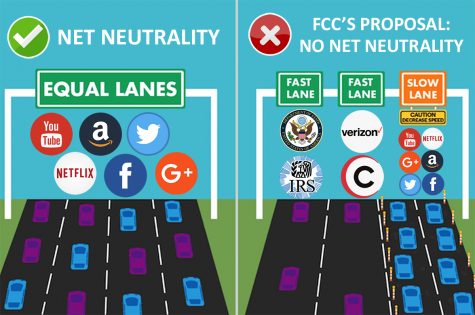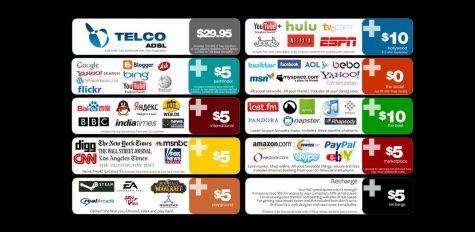The End of the Internet?
See how lawmakers in the European Union are trying to change the internet by enforcing stronger copyright laws such as Article 13 and eliminating net neutrality
November 29, 2018

A SLOW RIDE: Net neutrality helps keep internet speed and other services regulated, with the FCC preventing companies from becoming too powerful.
On February 26th, 2015, the strongest laws of net neutrality were passed. That meant that most, if not all content on the internet was accessible to anyone. However, on December 14, 2017, the Federal Communications Commission (FCC), chaired by Ajit Pai, voted to repeal net neutrality–meaning that the internet was no longer regulated by the government. This repeal created a rise in nearly completely unregulated internet by the government and other service pricing, according to Forbes. Most recently, on September 12, 2018, the EU voted to create Article 13, which put into play one of the harshest instances of censorship on the internet.
Net neutrality and Article 13 are two seemingly mundane news topics going around right now. But what sets them apart is their ability to tear the internet in two. See how these two controversial news laws are going to affect you.
So, what is net neutrality?
Net neutrality means that no company can block a certain user or what they view and charge more money for it depending on what race or background they are. It is important to the everyday internet user because it allows them to access a site without having to pay for it. Currently, this issue is a topic discussed by the Supreme Court, and net neutrality is a concept supported by major companies, such as Verizon and Comcast, that are trying to create these laws. However, this issue runs much deeper than that. As more and more people log onto the internet for the first time, internet providers are working to figure out how they can make more money. Businesses often strive to make the largest profit possible and with the repeal of net neutrality providers will be able to earn a lot more.
Both net neutrality and Article 13 are based on stricter copyright laws. With the banning of certain content from original sources such as Disney, people are trying to alter what it was originally meant to be. As Ethan Folkman ’21 said, “Copyright laws are fair, as the source material belongs to a certain company–Nintendo, Disney, et cetera. As long as they don’t affect the prequel memes, everything is good.”
How does this affect the average user?
Fortnite is completely free to play, and Netflix requires a monthly subscription, but once accessed, there is no limit to the number of shows that you can view. But what if you couldn’t access a certain part of Netflix because you had a profile that didn’t meet the company’s standards, such as being part of a certain culture or group of people? This means that a poorer non-white neighborhood could be targeted for higher internet costs. If net neutrality were removed, your internet provider, your cable company or any website could pick and choose “favorites,” giving certain sites faster speeds or charging more for them, according to the Washington Post.

PAY TO PLAY: Without net neutrality, certain apps and services could become more expensive. For instance, websites such as Amazon, Paypal and Google would be added à la carte, on top of your internet bill.
But *gasps* what if Fortnite is now pay-to-play? The popular game, Fortnite, is currently free, which makes it appealing to new users. But with the ability to sell the game, Fortnite might just turn into a paying game. Fighting against the repealing of net neutrality helps keep our online space available to anybody.
If this is bad, how can it get any worse?
Net neutrality prevents companies from being picky when choosing who can receive their services. Article 13, on the other hand, is a stricter censure of copyrighted content. Article 13 is a law that results in stricter copyright laws. Reposts of original content under different accounts will be shut down in an attempt to prevent other people from viewing the content. According to CNET, this change means memes, which are reposted content surrounded by a joke, will be heavily regulated in order to prevent copyright infringement. Memes often use still images from popular television shows or films combined with quips, puns, and topical humor. The popular format is inescapable on the web, but the changes brought about by Article 13 could force internet companies to ban their use.
However, not all students are concerned. “I think it isn’t going to be that big of a deal because people aren’t taking credit for the copyright material. They are just making parodies of it to embody today’s culture,” said tech ambassador Michael Mohammadi ’19. “If the new laws take away people’s ability to post parodies of photos, then they are just going to get more creative and you’ll probably see more variety of memes instead of the same photos with different captions.”

WISE WORDS: Mohammadi ’19, a Berkeley Prep tech ambassador, believes that Article 13 might not threaten internet freedom.
Article 13 may just be starting in the EU. But with stricter copyright laws on the rise, content censure is bound to spread to America, according to Wired UK. Regarding reposted content on the internet, the original creators will try to block it however they can.
“Stricter copyright laws shouldn’t have such a significant impact in nations that don’t condone the law itself, and I don’t think this is going to change anything regarding the sharing of memes,” said avid gamer Austin Cahn ’19. “[You] can’t really detect copyright concerns on such a diverse medium.”
What do you think of Article 13 and the removal of net neutrality? Do you support either of them? Let us know in the comments below.



